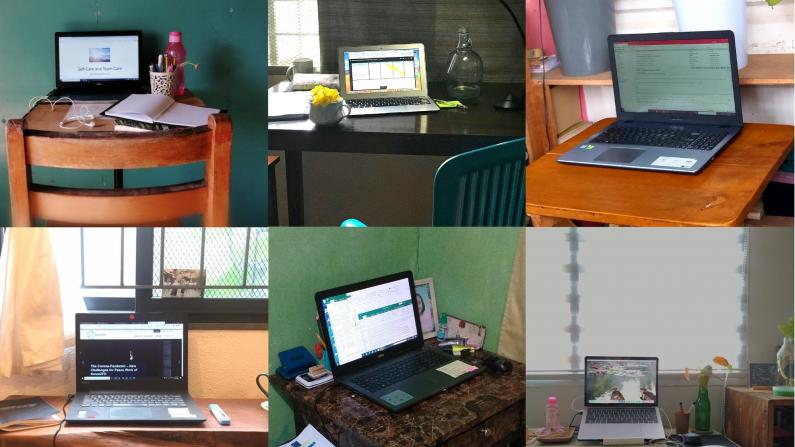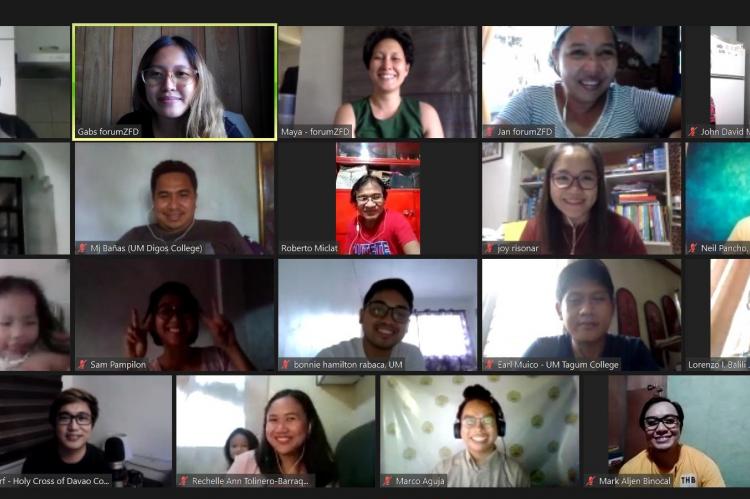
The COVID-19 pandemic affected the Philippines early on registering the first COVID-19 related death outside China as early as February. Since then life in the Philippines, as everywhere else, has changed dramatically. The national government imposed one of the strictest and longest lockdowns worldwide, restricting movement to the very minimum and putting most economic activities on hold. Shops, restaurants, and offices nation-wide were closed and millions of workers had to adjust to home office, reduction of income-generating activity or, in case of many jobs in the informal sector, a loss of income.
As an international organization with reliable public funding and sufficient equipment and resources to shift to remote working, forumZFD has been in a comparatively privileged position throughout the pandemic. However, the pandemic’s effect of deepening inequalities is also felt in our work. For the project teams that predominantly work with marginalized communities such as indigenous people in remote areas, a lack of access to internet and/or cellular reception has been a major limitation. More generally, access to communication technology became a determining factor whether or not partners were able to participate in remote activities thereby exacerbating existing socioeconomic divides. In other cases, even when communication was technically possible, the additional challenges of the pandemic meant that partners could not participate in activities in a meaningful way. Particularly for partner teachers in our peace education projects, the shift to online teaching and the financial pressures on the institutions they are embedded in constitute additional stressors.
Adapting to what works in times of pandemic
As a consequence, the project teams had to adapt their strategies and activities based on what is feasible for their partner organizations. Initially the forced and sudden pause on activities posed challenges for the team. One of our colleagues in Cotabato commented: “In the beginning I personally felt pressured with all the delays and restrictions that hampered much of our plans for this year.”
Since travel restrictions cut off their access to their partner communities, most of the teams shifted to virtual platforms and remote accompaniment in engaging their partners. Because their partners are mostly indigenous leaders in Agusan del Sur province and located in municipalities with poor health care systems, our team in the Caraga region was forced to postpone all their activities. Instead, they tried to compensate partner engagement through remote accompaniment and mentoring via phone calls. While the only feasible approach at the moment, this engagement over a distance cannot replace the intense community immersion they pursued before the pandemic. “Working with the grassroots without stepping on the soil where the grass grows is like a drone flying at a distance without seeing the nuances on the ground”, a colleague from our Caraga team lamented.
Our projects in the Davao region and the Bangsamoro Autonomous Region of Muslim Mindanao (BARMM), on the other hand, had the advantage that many of our partners are located in urban centers with access to internet. This meant, the team in Davao can easily shift to organizing online seminars instead of the planned physical trainings with their partner-teachers. Our youth partners in the BARMM further decided to conduct online advocacy related to COVID-19 to apply their learnings from previous social media-related workshops. To comply with curfew hours, the team in Cotabato adjusted the schedule for their radio program to allow the radio anchors of our partner organization KuMuNet to go home safely and for listeners to be settled in their homes.
Working from home came with its own challenges often requiring colleagues to combine work and family life in the same space. One colleague and a mother of two young children commented: “Managing my time with the kids and work, being a housewife and a daughter and a sister is exhausting at times.” While organization and management have been supportive in the shift, the ease with which tasks can be completed remotely varies greatly between positions. Additional to all partner engagement, the administration and financial management of the program was another area that posed particular challenges with finance and administrative staff having to find new ways of completing requirements within often strict timeframes. “I am not used to doing work from home arrangement but I learned to be creative. There are tasks that you cannot do urgently because you have to think of your colleagues and yourself if it can do harm”, our colleague in charge of administrative matters expressed.
Seizing the opportunities of a remote working environment
To be able to remain relevant and consistently accompany our partners during the pandemic, the forumZFD Philippines Program adapted its structures for cooperation and coordination between team members across positions and project offices. Our planning and monitoring processes were all shifted to virtual platforms which enable the participation of additional team members relevant to the process making for more inclusive, substantive and diverse discussions. Although a remote working environment cannot compensate physical meetings and brings its own challenges, it made exchange between team members to discuss common topics more accessible and easier to organize. The wide geographical distance between project offices, usually an obstacle to regular meetings, became irrelevant. This effect was even felt across forumZFD’s country programs from Southeast Asia to Eastern Europe: “I think I've never felt more connected with colleagues from other programs”, a colleague representing staff interests happily expressed.
Exchanges between our three project offices regarding their experiences and lessons learned in similar projects were very helpful in the process of developing new projects and adjusting to the pandemic. This way our team in the Caraga region was able to gather insights of our youth project in the BARMM before shifting their own work with youth leaders to online engagement.
These shifts in project design and team coordination were accompanied by renewed attention on our personal ways of dealing with the pandemic and the changes it has brought. One colleague realized that, “I had this self-imposed pressure to be ‘productive’ all the time. With team care sessions, I was able to realize that this is an extraordinary time.” While we may have found a working mode to continue and adapt our engagement in most projects, the dynamics of the pandemic and the measures taken in response to it require further flexibility. “We have to re-align and re-organize to adapt to our evolving reality”, one colleague remarked. This is true both on organizational level and for each of us personally: “Every day, I am learning to make adjustments”, she added.
Grappling with the ‘new reality’ continues
At the time of writing, 6 months after the entire Philippines was placed under lockdown in March, life is slowly coming back. Moving around our project locations and even between regions becomes more manageable even though many requirements have to be fulfilled and some members of our team are able to work from our offices again. Nevertheless, the nature of our work has changed and continues to be affected by the restrictions necessary during the pandemic. As we continue to find new ways to engage with and accompany our partner organizations, we learn from our experience, find new ways of collaborating, and build more participatory program management structures. Being impatient to go back into the communities we work with, we may nevertheless maintain some of the remote collaborations that have proven such a valuable bond between team members during the pandemic.
